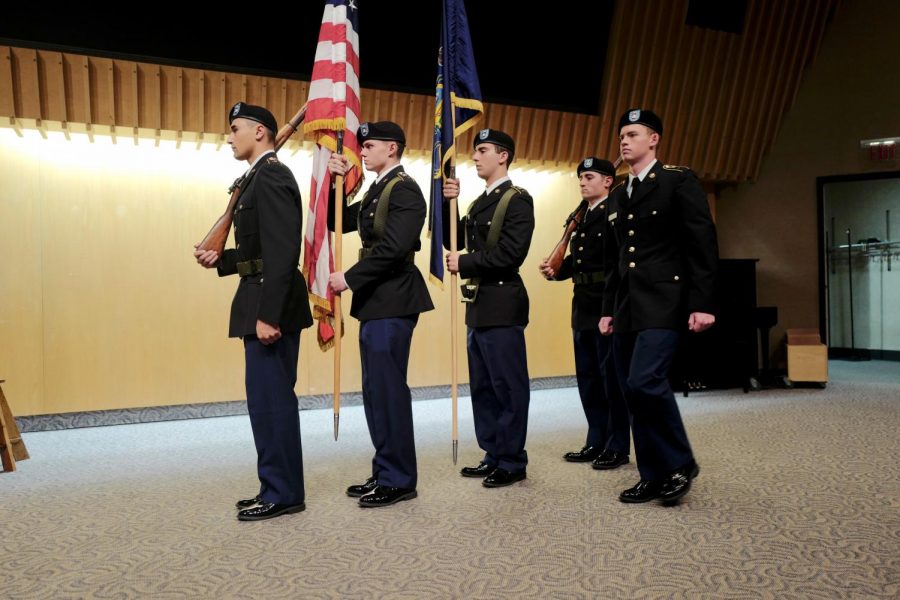9/11 Remembrance
September 13, 2018
The University’s College Republicans, College Democrats, and the Conservatives Club came together on Sept. 11 for an event in the Elaine Langone Center Forum to remember the events that occurred on Sept. 11, 2001.
Some of the University’s ROTC program members attended the event, processing into the ELC Forum carrying the United States flag and the state flag of Pennsylvania. Manning Martus ’21, president of the College Republicans, opened the event by introducing herself and Elizabeth Gray ’19, president of the College Democrats. Both presidents commented on the importance of remembering the events in New York, Washington, D.C. and Shanksville, Pa.
Professor of Sociology Alexander Riley also spoke at the gathering and implored those in attendance “not to forget what happened 17 years ago today.”
Riley wrote a book three years ago, “Angel Patriots: The Crash of United Flight 93 and the Myth of America,” about the fourth flight that was involved in the 9/11 terrorist attacks. This aircraft was United Airlines Flight 93, flying from Newark, N.J. to San Francisco.
Riley states that the heroism demonstrated on Flight 93 is comparable to those who fought in Lexington and Concord, Gettysburg, the Mediterranean Sea, and Normandy. These “heroes deserve our veneration and meditation on their deeds,” Riley said.
Riley went on to discuss four lessons the passengers on Flight 93 have taught Americans. The first lesson, Riley said, is demonstrated through the tardiness of the plane. The flight was 45 minutes late getting off the tarmac. The passengers would not have known what was happening in New York City and Washington, D.C. if they had left on time.
“No time is wasted time unless you make it so … the next time you are facing dead time or downtime, I encourage you to think about the meaning of those 45 minutes that sitting on a runway on [Sept. 11, 2001] and realize how precious each moment is and how little we know about the ultimate value and meaning of mere little inconveniences that force us to change our plans,” Riley said to be the first lesson that emerged from Flight 93.
The second lesson follows the actions of Jeremy Glick, one of the four passengers who spearheaded the attempt to take back control of the plane. Glick made a phone call to his wife, Lyz, in which he explained the situation in the air and repeatedly told Lyz how much he loved her and their daughter.
“I would encourage you to model this hero Jeremy Glick and remember to tell the people close to you how much they mean to you, for we never know how much time remains for us to see to this essential responsibility,” Riley said.
The third lesson comes from Todd Beamer, who called 911 and relayed to a Verizon operator the event occurring on the hijacked plane. A religious man, Beamer asked the operator to pray with him. The prayer focused on a faith in something that was larger than themselves.
“I encourage you to recognize that same need to be directed to things that extend beyond ourselves and our narrow daily concerns,” Riley said, regarding the third lesson.
The fourth and final lesson is demonstrated in the actions of Tom Burnett who made four separate calls to his wife while aboard the commandeered plane. Their conversation stressed the fact that Burnett, along with the other passengers, needed to courageously develop a plan to thwart the terrorists’ actions.
“I encourage you [to] recognize, as Tom Burnett did, how much you can do even in dire situations and to not become the type of person who instantly, in a time of crisis or in a time of difficulty, looks immediately and only to others for solutions. You can do more than you imagine,” Riley said.
Riley concluded his speech by encouraging the audience to remember the victims and survivors of the event of 9/11 today and every coming Sept. 11.
Due to weather complications, the audience was not able to plant the miniature American flags in the grass outside of the Elaine Langone Center. However, flags had been planted earlier on the morning of Sept. 11.






















